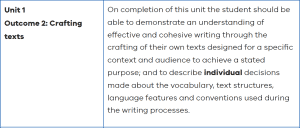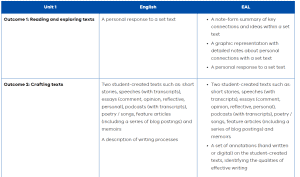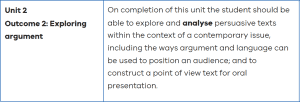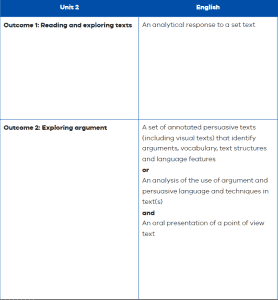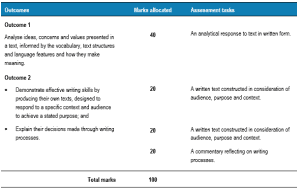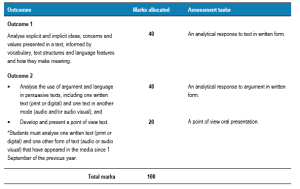English Study Designs are notoriously difficult to understand, let alone read. Following the introduction of the new VCE English Study Design in 2023, we are going to unpack it in a simple, organised fashion, to help inform you of everything you need to know for VCE English.
We will go through each unit, outlining all the material knowledge, skills and topics that are vital to your VCE English journey.
VCE English Study Design Structure
Key changes from the previous VCE English Study Design
Unit 1: Reading and exploring texts + Crafting texts
Unit 2: Reading and exploring texts + Exploring argument
Unit 3: Reading and respond to texts + Creating texts
SACs for Unit 3
Unit 4: Reading and responding to texts + Analysing argument
SACs for Unit 4
VCE English Study Design Structure
The 4 Units in VCE English are split up as follows:
- Unit 1: Reading and Exploring Texts + Crafting Texts
- Unit 2: Reading and Exploring Texts + Exploring Argument
- Unit 3: Reading and Responding to Texts + Creating Texts
- Unit 4: Reading and Responding to Texts + Analysing Argument
It is important to notice the correlation between Units 1 and 3, as well as Units 2 and 4. Although they have different titles, they are fundamentally the same.
Key Changes from the Previous VCE English Study Design
- The ‘Comparative Essay’ component has been completely removed from the Study Design.
- Creative Writing (‘Framework of ideas’) is now a component (‘Section B’) of the external examination for 3/4 English.
- You will write Argument and Language Analyses on written persuasive texts and persuasive pieces in another form (such as audio or visual) in 3/4 English.
Unit 1: Reading and Exploring Texts + Crafting Texts
This unit is generally your first introduction to Creative Writing, you will create or add to stories through a provided text or theme. Additionally, you will start writing VCE standard essays, which tends to be a surprise jump in quality expectations for many.
Area of Study 1: Reading and Exploring Texts (Essay Writing)
At the beginning of your VCE journey, you’ve likely been writing essays for a couple of years. Every student has at least gone through the process of analysing a text and then answering questions about it.
However, don’t underestimate this section, the study design often introduces students to new expectations and requirements for essay writing that can be difficult to achieve without extensive practice.
You will have to write an essay for assessment in this Area of Study. The VCE English Study Design Outcome outlines that you are assessed on:
– Extracted from the VCAA websites on the ‘Planning’ page
From this, we can gather that you are assessed on your ability to execute three skills:
- Context. This relates to how well your essay addresses the question you are responding to. This tends to be where English VCE students lose most of their marks. It is critical to ensure your whole response is catered towards the question.
- Knowledge. You need to show a deep understanding of the text’s characters, themes and author’s intent. This can be shown through your use of quotes, explanations and ultimate conclusions.
- Writing and Grammar. This is a skill that must be developed over the course of your schooling journey. I don’t want to sound like a broken record, but reading and writing is the only way to improve in this area.
Need to write an expert-level feature article for VCE English? Here’s a few tips to help you ace the criteria sheet…
Area of Study 2: Crafting Texts (Creative Writing)
You will engage with a set of ‘mentor texts’, these are texts that align with a ‘Framework of Ideas‘ (overarching theme and ideas) created by your school. The mentor texts can be a range of different forms, such as short stories, speeches, and poetry. You will use these mentor texts to make a creative text of your own.
According to the outcome, you will be assessed on your ability to:
– Extracted from the VCAA websites on the ‘Planning’ page
In summary, the creative writing task is based on your ability to:
- Create a text for a specific purpose. You must design your piece for a context and audience, and attempt to express, explain, reflect or argue.
- Demonstrate an understanding of the mentor texts. Your writing will need to be clearly influenced and guided by the mentor texts you investigated.
- Justify the decisions you made when writing the text. After writing your piece, you may be asked to create a description that explains why you took the text in the direction you did.
Unit 1 Assessment Summary
Wondering what you could be assessed on in this unit? Here are the types of assessments you can end up with for each Outcome:
– Extracted from VCAA’s website under the ‘Assessment’ Page
Unit 2: Reading and Exploring Texts + Exploring Argument
Apart from more essay writing, this unit focuses on ‘Exploring Argument’. This involves analysing an opinionated piece and outlining why it does a good job at persuading the audience to agree with their proposal, also known as a language analysis. Additionally, you will perform an Oral Presentation on a chosen topic recently discussed in the media.
Area of Study 1: Reading and Exploring Texts (Essay writing)
This area of study is the exact same as Area of Study 1 in the previous unit. Don’t believe me? Well here is the outcome for this unit:
– Extracted from the VCAA websites on the ‘Planning’ page
Sound familiar? In this Area of Study you will also be assessed on your essay writing.
Yes, there are slight differences in the key knowledge and skills sections between the two Area of Studies. However, these are simply to ensure teachers introduce you to different styles of texts for essay writing.
Additionally, these areas of study deliberately cover similar content! Thanks to the design of the curriculum, there’s nothing new to learn here, you’ll just need to continue to improve on your essay writing skills.
Area of Study 2: Exploring Argument (Analysis of Argument and Language)
Oral Presentation
The Oral Presentation aims to help you understand the thought process that goes behind making an opinionated piece. In the Oral, you will craft a speech that aims to convince the audience of a specific perspective on an issue.
You may have to perform an Oral Presentation on a topic that has recently been in the media for assessment. The Oral will assess:
- Public speaking skills. Good body language, clear articulation, and different tones of voice will be required.
- Argument building. How do you position the audience to eventually agree with your point of view?
- Knowledge of the chosen issue. Are you well versed in both sides of the argument? Do you have evidence to support your argument and refute possible weaknesses in your perspective?
Want help with your Oral Presentation? Have a look at The Comprehensive Guide to Acing your VCE English Oral Presentation.
Exploring Argument (Argument Analysis)
Language analyses are not the same as essays. Do not mix up the two, you must view them separately in order to do them both well. This task requires you to concisely unpack a persuasive piece which can be in written, audio or visual form.
The assessment will likely require you to write an Argument and Language Analysis on a persuasive piece. This is shown by the Outcome, which states:
– Extracted from the VCAA websites on the ‘Planning’ page
Generally, you will be marked on the following:
- Identification and exploration of techniques used to build the argument. How have language techniques, argument techniques, writing techniques and imagery assisted the writer or speaker’s argument?
- Understanding of the audience. How would the readers be influenced by the writer or speaker’s different techniques used in argument?
- Ability to display how the argument is developed. What is the writer or speaker trying to achieve throughout different points of their piece?
- Writing and Grammar. In a ‘language analysis’, you are expected to write extremely clearly and to the point, avoiding all the ‘fluff’ you would have in an essay.
Check out our full guide on How to Write an Argument Analysis for VCE English!
Unit 2 Assessment Summary
Curious about the assessments for this unit? Here are the types of assessments you can end up with for each Outcome:
– Extracted from VCAA’s website under the ‘Assessment’ Page
Unit 3: Reading and Responding to Texts + Creating Texts
Area of Study 1: Essay Writing
Yep. You guessed it, this Area of Study is the exact same as the other two essay writing Areas of Study. This is shown by once again familiar outcome:

Area of Study 2: Creating Texts
In this Area of Study you will be building upon your skills learnt in Unit 1. Your school will select three mentor texts for you to read from a list provided by VCAA. These mentor texts now align with a ‘Framework of Ideas‘, you will explore one framework in extreme depth and write about it in a SAC and eventually the exam.
The Frameworks are as follows:
- Writing about country
- Writing about play
- Writing about protest
- Writing about personal journey.
You will be assessed on the same skills as in Unit 1. Meaning you have design your piece to a specific context, audience and purpose, as well as explain your decisions made in the writing process.
This is one of your last chances to refine your skills before the English Exam. The text you write will be required to align with one of the four broad ideas which you can engage with in the exam. So, this can provide a strong foundation for your exam preparation!
Unit 3 SACs
Below is a table extracted from the VCAA VCE English Study Design. It outlines the SACs you will undertake during Unit 3 English. Outcome 1 is your essay writing SAC, Outcome 2 is your creative writing SAC.
Unit 4: Reading and Responding to Texts + Analysing Argument
Area of Study 1: Essay Writing
This is your final essay writing Area of Study for VCE English. It is important to realise that the standard of writing goes up with each Area of Study.
These more complex expectations are a main reason why you are expected to practice essay writing in each Area of Study. These expectations take a lot of practice to consistently achieve!
You should also note that the text you use in this Area of Study will very likely be the one you use in Section A (essay writing component) of the English Exam, as it will be the freshest text in your memory during the exam period.
Area of Study 2: Analysing Argument
Finally, the last area of study, and just like the rest of Units 3 and 4, you’ve already done this before! This section requires you to do language analyses and an Oral Presentation.
The Oral Presentation must analyse a form of media that has appeared since the 1st of September the previous year.
For the Argument Analysis, you will make one on a written text and another in a different form, such as audio or visual. You will be required to use the same skills as in Unit 2, Area of Study 2. Once again keep in mind that you will have to do a language analysis in Section C of the English Exam.
Unit 4 SACs
Below is a table extracted from the VCAA VCE English Study Design. It outlines the SACs you will undertake during Unit 4 English. Outcome 1 is another Essay writing SAC. Outcome 2 involves the Argument and Language Analyses SACs.
That’s all!
The VCE English Study Design may seem too detailed, a tad unnecessary or confusing. However, you will slowly realise throughout your VCE journey that it makes a lot more sense than what you originally thought. VCAA deliberately created this study design so that Units 1 and 2 of English prepare and essentially rehearse students for Units 3 and 4.
Therefore, make sure to take your Year 11 studies seriously! I promise that you will be grateful by the end of your English journey, if you take advantage of this well crafted Study Design structure.
Are you looking for some extra help with working through the VCE English Study Design?
We have an incredible team of VCE tutors and mentors!
We offer specialised English tutoring in Melbourne with expert tutors! Get in contact today to secure your expert coach.
We can help you ace your VCE English SACs and ace your upcoming VCE assessments with personalised lessons conducted one-on-one in your home or online!
Looking for a local tutor in Footscray? Or needing support for the VCE in Doncaster? We offer one-on-one tutoring, in your home or online!
We’ve supported over 8,000 students over the last 11 years, and on average our students score mark improvements of over 20%!
To find out more and get started with an inspirational VCE tutor and mentor, get in touch today or give us a ring on 1300 267 888!
Max Huyton is the VIC Growth Marketer for Art of Smart and a Laws and Commerce student at Monash University. In his other life, Max spends his time reading and writing whenever he gets the chance and cooking extremely mediocre dishes for friends and family.




